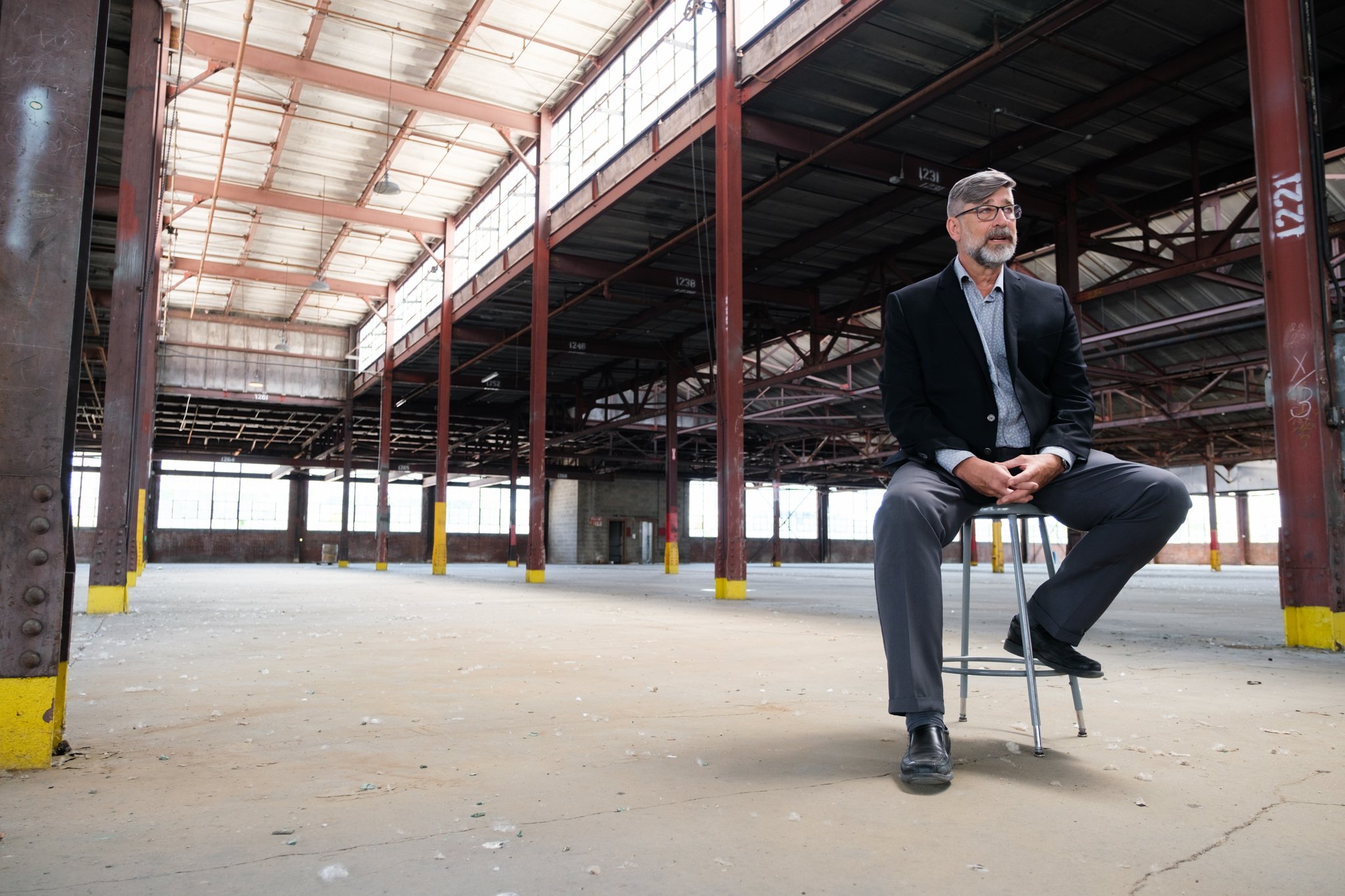Perched atop the roof of the former Mid-State Warehouse, his gaze directed down West Main Street toward Newark’s Courthouse Square, Todd Alexander is Michelangelo examining a block of marble.
Alexander has a crystal-clear vision. In a lifeless cluster of steel and brick, he sees beauty; feels, in his bones, a sense of urgency that it be shared with the world — or, at least, greater central Ohio.
Now to chip away at the rough edges and reveal the treasure underneath.
This is no small task: The charred remains of an adjacent warehouse, the singed beams of its collapsed roof bowing toward the ground, still await demolition. Somewhere beyond that, Raccoon Creek winds purposefully past. Beauty next to blight.
Alexander sees it all and, like the great sculptor, has spent months diligently chipping away. Bit by bit he will continue, until his vision is complete.
Alexander is no stranger to real estate development. A native of Pittsburgh, he attended Ohio State University to obtain a degree in engineering. He spent more than three decades at the Columbus-based Continental Building Company, serving as president for 24 years and overseeing the development of sites such as Columbus’s Lennox Town Center.
In 2020, he retired from Continental and launched A4 Ragtime Band Development with an aim to help breathe life into sites within his community. A three-acre property to the west of the shuttered Westinghouse factory on West Main Street caught his eye, and he went to see it with no intention of purchasing the adjacent buildings.
Until he saw them up close.
“As you walk around, you see the possibilities of what the building could be — and what it could be started to unfold,” Alexander recalls of the first time he walked through those stolid, neglected relics of a bygone industrial era. He was taken in by the natural light that streamed through the windowpanes and the layers of history built into the walls.
Sold on the potential of what could be but not blind to the colossal amount of work that would accompany it, Alexander and Ragtime purchased the 10-acre site, which extends along West Main Street from Raccoon Creek to 11th Street, in December 2020 for $425,000.
Two buildings were incorporated into the purchase: An older, 140,000-square foot structure deemed unsalvageable from the beginning, and a 122,000-square foot building set further back and to the west.
The larger building began as the Simpson Soap Factory, changing over to Pharis Tire and Rubber Co. in the early 1900s. The plant was responsible for producing bike and vehicle tires for brand names such as Firestone and U.S. Royal, as well as its own Pharis label. It closed its doors in 1948, then shortly thereafter became the property of Westinghouse, furnishing parts for White-Westinghouse appliances.
According to Newark Advocate archives, Consolidated Industries, the parent company of White-Westinghouse, announced in June 1985 plans to close the plant. It finally shut down in October 1988 after nearly four decades in business.
Originally Alexander had hoped steel from the building could be sold to help pay for the demolition cost, but a fire ripped through in the early morning of April 17, intensifying the damage.
The newer building, most recently known as the Mid-State Warehouse, was erected during World War II and also used by White Westinghouse. Built to government speculation, it’s “very heavy and very well built,” Alexander says.
“This building is built like a tank. It's all concrete, steel and masonry. And the floor loadings are 400 pounds a square foot, which is easily three times which you would build a structure for today. So a very stout building.”
And this is the solid foundation upon which Alexander’s dreams begin.
The first phase of his plan, The Yard at Newark Station, opened in May of 2021, offering a mix of recreation and refreshment. It consists of four lighted sand volleyball courts — Alexander meticulously researched their construction to ensure the sand would dry quickly after a rain — cornhole and horseshoes and, to round out the experience, a food truck, full bar and taco service. Live music rotates on a weekly basis, and when the weather cools, guests are invited to gather around fire pits to take an edge off the chill.
After a successful first year, The Yard charged into 2022 full steam ahead, even after the fire shut down a portion of West Church Street for months.
Alexander admits he started the season in a dark place, but the community that brought him out is the same one he hopes to cultivate moving forward.
“When that building caught fire, I was depressed. I had the wind taken out of my sails. I became disillusioned. I thought, ‘What am I doing?’,” he recalls. “But then we opened The Yard and people came. And you talk to them, and the families and the little kids and the dogs that are there, and everybody that's there is just wonderful, wonderful people. And I enjoy it so much — enjoy meeting all these people.
So that's kind of the vibe we want throughout this, that we're a community; that we're here to help one another.”
And so, with renewed vigor, Alexander resumed his position as part-visionary, part-handyman, part-janitor, part go-to guy, dreaming up the phases to come. At his side are co-founder Seth Stout, who serves as Newark Station’s Director of Operations, and Alexander’s son, Jacob.
The massive undertaking collectively known as Newark Station will include multiple components:
Bearing the name of the nearby prehistoric mounds, Earthworks Coffee at Newark Station will provide simply priced coffee and bulk products that reflect a product-of-the-earth motif. At night, Earthworks will transform into Newark Station’s evening lounge, packed with entertainment and activity. Guests can enjoy a full bar and cocktail service as Earthworks curates ongoing live entertainment experiences.
The ground-level coffee shop and bar serves as a gateway to a massive warehouse space built to nourish a buzzing arts community. Known as “The Lots,” these spaces, in homage to the city’s history of makers, will be available to be rented out for artists and visionaries looking for space to expose and develop their craft. At this modern-day trading post, Newark craftspeople can inspire and educate by working alongside each other to create art and business in bespoke offices and studio spaces.
“We will curate uses that will play with one another, if you will,” Alexander says. “So if I'm down in an art studio on the first floor, maybe there's a support system up here on the office floor that there's a young lawyer or a marketing company, and they're just getting started and we're able to pair them up and they can work together to be successful.”
Upstairs, leased office spaces come with the opportunity to engage Newark Station’s built-in audience with workshops, programming, and events.
Along the western edge of the building, 22 industrial loft apartments will be available for rent, offering homage to their industrial roots with elements of exposed brick, large windows, and stainless steel appliances, in addition to access to Newark Station’s vast amenities.
At the rooftop Lookout Taproom, visitors can enjoy a quick bite, cold drink and a sweeping view of the city in a casual drafthouse atmosphere.
Glasshouse, an Italian-inspired kitchen, promises to be a favorite spot for gatherings with family and friends with a menu highlighting “bold Italian flavors.”
Framing the property that faces Main Street, the site of the former soap factory will be dubbed Renaissance Park and transformed into a public green space that will ideally serve as a place for outdoor arts-focused events and exhibits, with an amphitheater and access to the water.
Is it ambitious? Yes.
Too ambitious? Not for Alexander.
He isn’t in it to flip a decrepit warehouse property and make a buck. He’s investing in Licking County because, as a resident, he wants to see it succeed.
“For 34 years, I left Licking County and drove west in the morning. When I left and semi-retired, I was like, ‘I want to wake up in the morning and head east. I want to be in my community and I want to do something to improve it. I want to do something to make it better.’ I wasn't just looking to flip a buck, and obviously I've got to make a dollar, but I wanted to do something that would be meaningful and significant to the community that could help turn the west side of Newark around and give people hope and opportunity and jobs in a unique place.”
Plus, there’s a soft spot in Alexander’s heart for the arts, and though he never pursued them as a profession, he sees Newark Station as his way of exposing them to the world — and giving creators a chance to shine.
“I don't worry about the skeptics. I have my own goals and I have my own tolerance for what I feel is going to happen and the success of it. And that's my measuring stick,” he said. “I don't need to make a fortune. I just need to make it work. And I truly believe that this community deserves it.”







